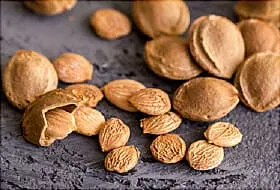Amygdalin is a compound found in the pits or seeds of apricots, apples, peaches, plums, red cherries, and other fruits. It's also in bitter almonds.
A partly man-made, purified form of amygdalin, known as Laetrile, was patented in the 1950s and became a popular alternative cancer treatment during the 1960s and '70s. It's now banned by the FDA and hasn't been available in the U.S. since 1980.
Many websites tout the benefits of amygdalin (also called nitriloside, purasin, and vitamin B17) for cancer. Though these sites post stories of personal successes after using it, the scientific proof simply isn't there.
How It Works
The way your intestines break it down makes cyanide, which supposedly kills harmful cancer cells.
Some people have also suggested that it teams up with enzymes in cancer cells to destroy them.
Others say the cancer was caused because you didn't have enough "vitamin B17." But there's no proof that amygdalin acts like a vitamin in your body or that you even need it. Calling it a vitamin is a way to get around regulations for drugs.
What the Research Says
Animal and lab studies of amygdalin have mixed results. Several found no benefit, while others suggest the chemical has a slight effect on certain kinds of cancer cells. It might help relieve pain.
To date, there haven't been any "controlled clinical trials" on amygdalin. This means scientists haven't compared people who receive the treatment to people who don't.
Why It's Dangerous

Symptoms of cyanide poisoning include:
- Dizziness
- Being queasy and throwing up
- Headache
- Blue skin
- A droopy upper eyelid
- Trouble walking
- Confusion
- Fever
These problems are usually worse when you swallow amygdalin rather than injecting it.
You're more likely to have a bad reaction if you also take high doses of vitamin C or eat foods like:
- Raw almonds
- Crushed fruit pits
- Peaches
- Beans such as butter, lima, and mung
- Bean sprouts
- Carrots
- Celery
- Flaxseeds
Because amygdalin isn't FDA-approved, it could have dangerous ingredients. Products from Mexico, the main supplier of amygdalin, have been reported with bacteria and other harmful substances in them.
The Bottom Line
Amygdalin is an unproven treatment that could hurt you.
Talk to your doctor about any alternative or complementary therapy you think might help.

